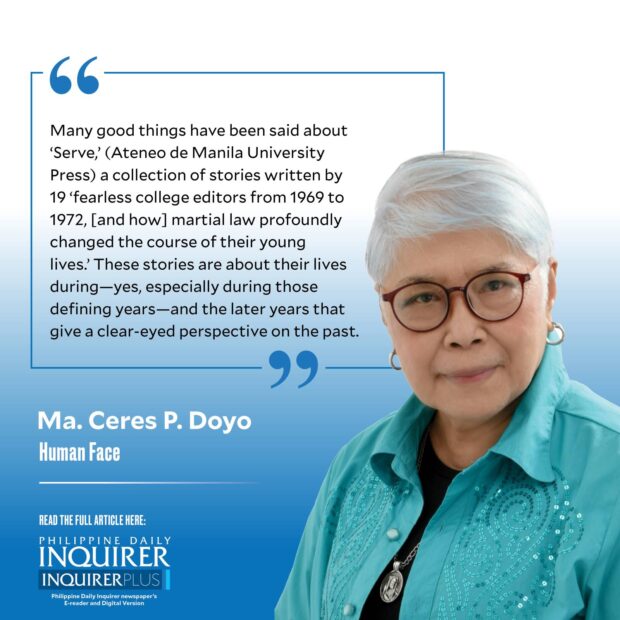Fresh out of college, many campus journalists found themselves in the maw of a fearsome beast when in 1972, Ferdinand Marcos Sr. put the country under martial law and in the iron grip of his dictatorship that would last 14 years. Stories about that dark period continue to be told in various ways though they are never enough—through movies, documentaries, theater, poetry, songs, visual arts, books. The written word, I say unabashed, has a long shelf life, so all praise for those who write even with much pain that comes with remembering.
Many good things have been said about “Serve,” (Ateneo de Manila University Press) a collection of stories written by 19 “fearless college editors from 1969 to 1972, [and how] martial law profoundly changed the course of their young lives.” These stories are about their lives during—yes, especially during those defining years—and the later years that give a clear-eyed perspective on the past. It sure took courage to relive the past in writing. The eyes blur, the heart beats fast, the blank screen/page conjures up images.
The book was edited by Jo-Ann Q. Maglipon (a friend of more than 40 years!) who belonged to that generation of campus writers whose individual lives could have intersected at some crossroads or who walked the same paths less traveled or who turned for the more perilous forks on the road, who shared the same passion to rid the motherland of a tyrant. Not all of them survived to tell their stories. The book “honors the memory of friends and comrades who have gone ahead, having offered their lives in service to our people. We dedicate this book as well to all young Filipinos who dream for a just, free, and equitably prosperous Philippines. We were once like you. We still are.” “Serve” can serve as a bridge between generations.
The writers: Thelma Sioson, Senen D. Glorioso, Elso U. Cabangon, Alexander Aquino, Judy M. Taguiwalo, Manuel M. Dayrit, Derly Magcalen, Eduardo T. Gonzalez, Rey Vea, Jaime A. Florcruz, Chito Sta. Romana, Sonny Coloma, Bob Corrales, Jones T. Campos, Sol Juvida, Mercy M. Corrales, Angie Tocong, Butch Dalisay, and Diwa C. Guinigundo. Some of these names should be familiar to many. Space constraints prevent me from including the titles, so revealing in themselves, but here are three: Sioson’s “A colegiala speaks: Fighting a most seductive dictatorship with another beguiling ideology,” Dayrit’s “Serving where I must: Stories of a physician who came of age during martial law,” and Sta. Romana’s “Accidental exile becomes steadfast ambassador.” The stories are bookended by Dalisay’s prologue, and Maglipon and Guinigundo’s epilogue, both elegantly written.
Oh, but how I wish Maglipon’s speech at the book’s launching on Sept. 9—where she enumerated what the book is not—had been included in the book. You can read it in www.thediarist.ph (“We are here, we remember everything, and we write.”) “So, why this book?” she asked. “To fight fantasy, forgetting, flagellation. To stop the gaslighting of activists of yesteryears for the resurrection of a dictator’s family. To rebuke the exhortation of harmony and unity, false and deceitful. To demand apology, atonement, redress. And yes, to remind the powers—we are here, we remember everything, and we write.” Maglipon was a political detainee.
Some excerpts:
Taguiwalo: “In 1984, in the waning years of the dictatorship, I was imprisoned a second time, this time in Camp Crame. I was allowed to use a manual typewriter. I was four months pregnant, and I gave birth to my daughter inside the camp. There I wrote the poem ‘Waling Waling,’ and I dedicated this to Coronacion Chiva, a revolutionary leader of the Hukbalahap Mapagpalaya ng Bayan in Iloilo in the 1950s.”
Sta. Romana: “We were wanted persons. We were going to be charged with inciting to rebellion, or downright sedition, for the crime of leading anti-Marcos rallies and demonstrations. Suddenly, returning to the Philippines was out of the question. One year later, on Sept. 21, 1972, martial law was declared. Any hopes of going home vanished. This is how I ended up living almost all of my whole adult life in China.”
Campos: “Just months later, I would learn that the stranger I had welcomed into my home informed on me. And not just me, on many of us. This led to my arrest and the arrest of the others. For one dark moment, I must admit, I regretted doing the right thing for another human on that stormy day.”
Sioson (in her letter to her sons): “I don’t mean to underrate your daily struggles of traffic, slow food deliveries, dead spots. Nonetheless, I don’t want to keep you from knowing that, in our time, our daily concern was who among our collegemates or friends had disappeared into the night, never to be seen again.”
What’s your martial law story? Mine was “Better Dead than Read: The Years of Writing Dangerously” that came out in the Sunday Inquirer Magazine. Remember. Write. Like you alone know.
—————-
Send feedback to cerespd@gmail.com


